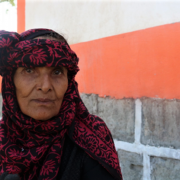Speeches Shim

The maternal mortality rate in Yemen is among the highest in the region. Due to the lack of services, 1.2 million pregnant and lactating women suffer from either moderate or severe malnutrition. Moreover, women are often responsible for fetching water every day from the nearest water sources. Even pregnant women transport water from far places, carrying heavy cans for long distances under the sun’s heat, which risks their babies’ and their own lives.
USAID has undertaken critical tasks in rebuilding Yemen’s fundamental economic institutions. USAID supplies technical assistance to the Central Bank of Yemen and the Ministry of Finance, the two institutions most important to facilitate investment and business opportunities. USAID and the US Embassy to Yemen work closely with the International Monetary Fund and the World Bank to promote institutional reforms and business opportunities. This includes maintaining access to basic goods and services, enabling access to financial services, amending regulations to support business-led growth, and promoting peace and stability amid the on-going conflict. USAID also works with local financial institutions and maintains close connections with government agencies needed to navigate complexities of the current business operating environment. More specifically, USAID helps businesses to 1) improve productivity, 2) upgrade processing facilities, 3) gain access to finance, and 4) enhance supply chain resilience.
Humanitarian assistance is critical in Yemen, but on its own will not prevent the collapse of key social and economic institutions, stem the tide of conflict, or build Yemen’s resilience to future shocks. For this reason, in 2017 USAID relaunched its development assistance program in Yemen to help put the country on a path to recovery and ultimately to end the need for foreign assistance. USAID works with international and local partners to address the underlying causes of instability. Our work focuses on improving the full spectrum of Yemeni systems and institutions, government, civil society, private sector, and communities, to help lay a foundation for durable peace and resilience.

For Doaa Omar Al-Habashi, the end of September 2020 was marked by great excitement. As a newly minted graduate from Hadramawt University for Sciences and Technology, she celebrated with pride the achievement of her completed bachelor’s degree in English Translation and Literature. However, mixed with the elation was an equal measure of apprehension. “I worried my efforts would prove to be in vain,” she explains. “I had only a blurred vision of where to go next to look for a job or gain more skills. I wondered if I would end up just adding to the ranks of the unemployed.”

The buzz of a single honeybee may seem like an insignificant detail in a country facing the scale of economic and humanitarian challenges seen in Yemen. However, for the 100,000 or so beekeepers and businesses along the country’s honey value chain, it is a sound that resonates with the promise of improved livelihoods. Yemeni honey is among the most prized on the planet, and the country’s production has an essential role to play in rebuilding its economy and international exports. Even in the context of the COVID-19 crisis, USAID is revitalizing the Yemeni honey sector and spreading benefits to farmers and traders along the value chain through better technologies and new sales agreements. Since September 2020, USAID has helped honey farmers and buyers sign more than 50 sales agreements worth $1.5 million, with new fair price contracts being signed every week.
Pages
Last updated: May 02, 2022


Comment
Make a general inquiry or suggest an improvement.